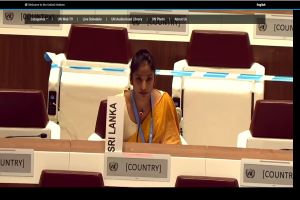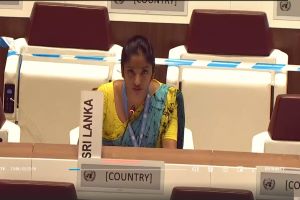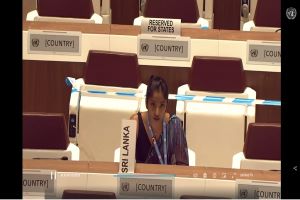
11 August 2021
Thank you Mr. Chair,
I will make two brief comments on section 3 before providing some comments on section 4. We fully support the retention of specific references to branches of international law in section 3.1 for reasons we have repeatedly mentioned in our previous statements and by other colleagues this morning as well.
Secondly, the willingness of programmers of autonomous weapon systems to ensure compliance with the existing legal norms and principles is a serious concern. Therefore, we support the inclusion of the word ‘development’ in section 2 as suggested by Austria and supported by other delegates.

11 August 2021
Thank you Mr. Chair,
I will make two brief comments on section 3 before providing some comments on section 4. We fully support the retention of specific references to branches of international law in section 3.1 for reasons we have repeatedly mentioned in our previous statements and by other colleagues this morning as well.
Secondly, the willingness of programmers of autonomous weapon systems to ensure compliance with the existing legal norms and principles is a serious concern. Therefore, we support the inclusion of the word ‘development’ in section 2 as suggested by Austria and supported by other delegates.

Sri Lanka fully supports the reference to international human rights law in the general considerations section. Given the possibility of autonomous technology to be used in situations of armed conflicts as well as in law enforcement situations, recognition of the relevance of international human rights law and criminal law is important. Principles of non-discrimination and human dignity are cardinal principles of international human rights law which have a direct relevance to our discussion today.
Secondly Sri Lanka supports a stronger emphasis on ethical considerations. While it is understood that ethical dimension is already included in the IHL principles, a separate paragraph on this issue, we believe is an important reinstatement. Decisions on human life are too important to be left to the blunt expedient of a mechanical judgment.

Sri Lanka fully supports the reference to international human rights law in the general considerations section. Given the possibility of autonomous technology to be used in situations of armed conflicts as well as in law enforcement situations, recognition of the relevance of international human rights law and criminal law is important. Principles of non-discrimination and human dignity are cardinal principles of international human rights law which have a direct relevance to our discussion today.
Secondly Sri Lanka supports a stronger emphasis on ethical considerations. While it is understood that ethical dimension is already included in the IHL principles, a separate paragraph on this issue, we believe is an important reinstatement. Decisions on human life are too important to be left to the blunt expedient of a mechanical judgment.

9 August, 2021
Mr. Chair,
We thank you for the draft elements paper on possible consensus recommendations circulated last Friday.
We have been engaged in discussions on technological, legal, military and ethical considerations of the development of autonomous weapon systems in this GGE forum since 2017. Over the years, a growing number of States have repeatedly flagged the alarming consequences of the challenges posed to fundamental IHL principles and humanity by the potential use of autonomous weapon systems and the urgent need for internationally agreed prohibitions and limitations.
During the discussion last Friday, some delegations re-iterated the need for our discussion to be based on the 11 guiding principles adopted in 2019, as reflected in the decision of the High Contracting Parties in 2019 , where it called upon the Group to consider the guiding principles, with a view to further develop and elaborate.

9 August, 2021
Mr. Chair,
We thank you for the draft elements paper on possible consensus recommendations circulated last Friday.
We have been engaged in discussions on technological, legal, military and ethical considerations of the development of autonomous weapon systems in this GGE forum since 2017. Over the years, a growing number of States have repeatedly flagged the alarming consequences of the challenges posed to fundamental IHL principles and humanity by the potential use of autonomous weapon systems and the urgent need for internationally agreed prohibitions and limitations.
During the discussion last Friday, some delegations re-iterated the need for our discussion to be based on the 11 guiding principles adopted in 2019, as reflected in the decision of the High Contracting Parties in 2019 , where it called upon the Group to consider the guiding principles, with a view to further develop and elaborate.
Group of Governmental Experts on Lethal Autonomous Weapons Systems (LAWS) Statement by Sri Lanka
Expired
5 (a) An exploration of the potential challenges posed by emerging technologies in the area of lethal autonomous weapons systems to international humanitarian law
3 August, 2021
Mr. Chair,
Excellencies, Distinguished participants,
At the outset, Sri Lanka would like to congratulate you on your assumption of the Chair of the Group of Governmental Experts on LAWS and for the continuous engagement with states on this issue. Let me assure you Mr. Chair, of the full support and cooperation of my delegation as we approach the preparation of the recommendations of the GGE to the 6th Review Conference of the CCW.
Sri Lanka aligns itself with the position expressed in the Working Paper submitted by Venezuela on behalf of the Non-Aligned Movement (NAM) on possible consensus recommendations.
Since this session is dedicated to exploration of the potential challenges posed by LAWS to IHL, our remarks will be aimed at addressing this particular issue.
